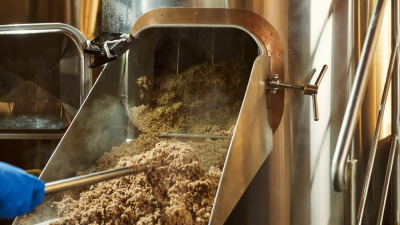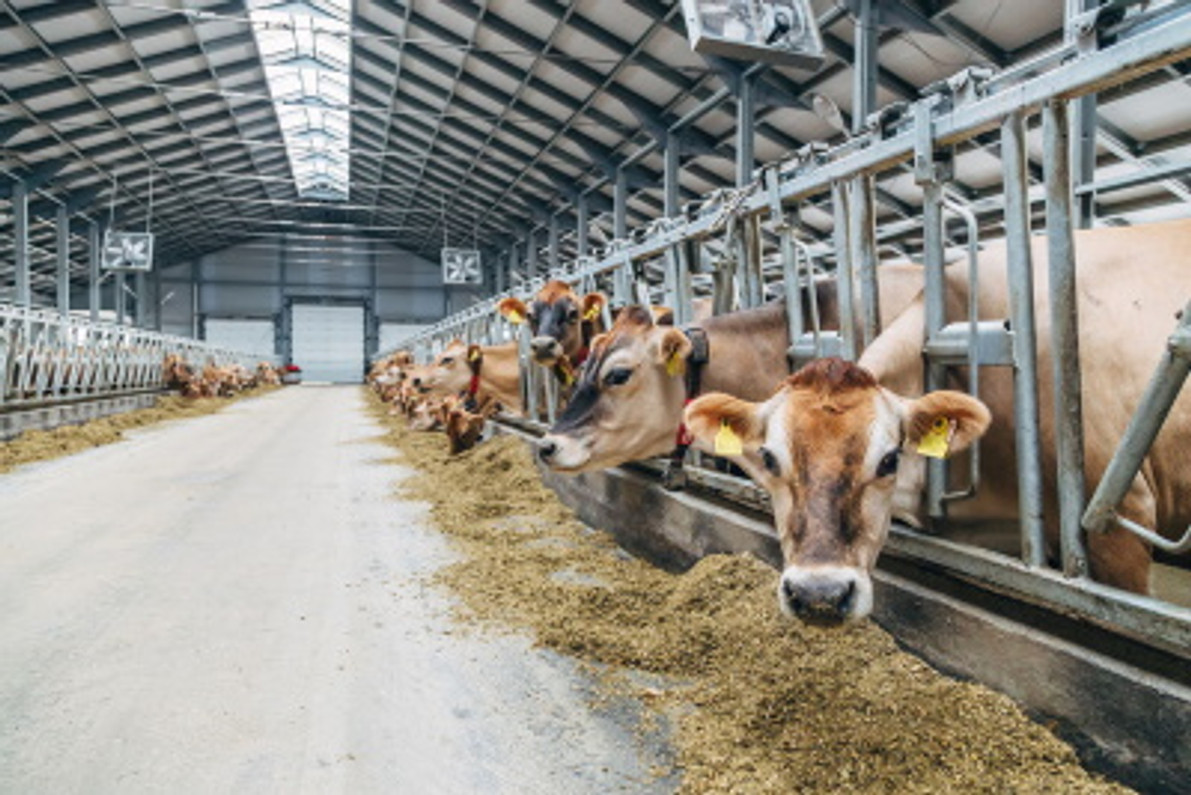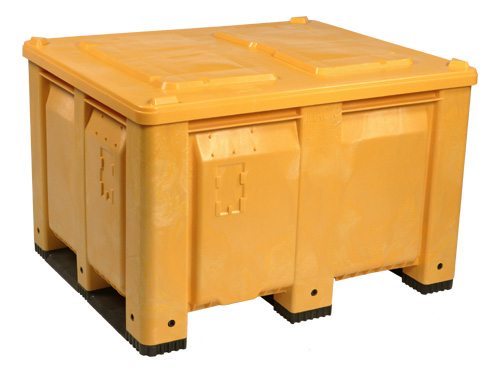Breweries Embrace Sustainability with Spent Grains for Animal Feed
Brewer’s spent grain (BSG) is a byproduct of the brewing process that accounts for approximately 85% of the waste produced by a brewery. BSG is composed of barley malt grain husks and is the solid food waste residue after wort production. Once the malt is mixed with hot water and steeped into sugars, the liquid wort is separated from the solids. This liquid is fermented by the brewing yeast to produce alcohol. Once the barley has been soaked, sprouted and dried it is deemed “spent” because most of its starches have been extracted and it cannot be used to make more beer. The spent grain is initially hot and wet. It has a short shelf-life, providing a persistent challenge for brewers with high production output and/or limited space. In the summer months, spent grain can sour in a matter of hours and create a stinky mess, attracting pests and distracting patrons. To give you a sense of the scale of this issue, every 6-pack of beer produces one pound of spent grain. Simply dumping spent grain into our landfills seems incredibly wasteful and harmful to the environment, not to mention time consuming. Fortunately, there are a number of sustainability options that reduce the waste and environmental impact of breweries, and potentially earn extra revenue.
BSG is naturally high in fiber and protein, making it of great interest as a food additive. Some food companies will grind the spent grains into a powder, replacing flour in baked goods such as snack bars, bread, crackers and pet food. This initiative is known as “saved grains". It can also be used in agriculture as a soil amendment to fertilize crops or feedstuffs for aquaculture. The most popular option for brewers is to use them to supplement livestock feed. The high costs of feed is a major cost for farmers raising cattle and other livestock. This has resulted in great synergy between brewers and farmers in communities as they look for sustainable ways to support each other. When dealing with small volumes, the farmer would be happy to haul off whatever you have for free. It’s also common to barter for beef, which breweries can use in their restaurant. For larger breweries, the volume of spent grain can be significant. Many breweries gain a new revenue stream while improving their sustainability. The value of spent grain is largely based on the moisture content. The drier it is, the more valuable, so it is important to efficiently use the lauter to remove as much moisture as possible. The ideal moisture level is 70-80% so that it stores longer.
Fiber is digestible by ruminant mammals (even-toed, hoofed, four-legged mammals that eat grass and other plants), including cattle, bison, goats, and sheep. And, in fact, most of a brewery's spent grain (BSG) is used to feed cattle. However, BSG can be fed to poultry, if the exogenous enzymes xylanase and B-glucanase are added. These enzymes degrade the fiber from the BSG and make them digestible to the chickens. Hogs will also eat BSGs, although they will derive less nutrition from them than cattle.
The FDA Cares About What You Do With Spent Grain
How you store and dispose of your spent grain matters to the FDA. The Food Safety Modernization Act (FSMA) of 2011 (specifically 21 CFR 117.95) regulates that brewers use proper containers that prevent physical, chemical or biological contamination if your spent grain is consumed by animals or humans. The Sanitary Facilities and Controls section under Good Manufacturing Practices (GMPs) encourages paying attention to spent grain storage – where, how and the duration of storage – because spent grain is a major attractant to small and large pests. Your spent grain bins must be properly labeled so that they are not misidentified as trash. For example, imagine the risk you pose to cattle if broken glass was accidentally swept up into spent grain and fed to them. That’s why the gray Rubbermaid trash bins are a major concern. Bins need to be inspected and sanitized when they leave or enter your facility to prevent contamination from the fields. Listeria is very prevalent in soil, but manure carries harmful bacteria and doesn’t help the taste of your craft beverage. If the spent grain is being used in human food, the FDA mandates that you have a Hazard Analysis and Critical Control Points (HACCP) food safety plan.

What Are My Options?
- Brew
Pubs & Nanos
For smaller production, the Rubbermaid® Brute® trash cans are likely the best option. They offer bright colors to differentiate from the standard gray trash container, use USDA compliant materials, have mold-in handles for easy lifting, and come with optional lids to keep pests out. You can even line these with trash bags for easier cleanup.
- Small
to Medium Production Breweries
For facilities with higher production output, it is best to use a bin that can be moved and lifted with a pallet jack or forklift. This reduces work-related injuries from lifting the hot/wet grains which are fairly heavy. The grains can be automatically pushed out of the lauter tun doorway into a bulk container. The rest can be cleaned up using our spent grain food hoe . Our spent grain bulk container is USDA approved, is 40” x 48” x 31” to support up to 1,500 lbs., and comes in 4 bright colors with matching lids. They are easy to clean with a simple power washer and can come with optional drain plugs. These containers can be nested/stacked when empty or stacked when full to save space until they are picked up by the farmer. The bottom runners allow them to be tilted/dumped via forklift. Some brewers prefer to keep their bins in-house and dump into a truck/trailer so they don’t run the risk of contamination from cattle waste. Others, have the farmers take them to the fields and sanitize them upon return to the brewer.
- Large
Production Breweries
For large facilities that have a big budget, spent grain silos are excellent. The grain is sent directly from the tanks to the grain silo outside via pumps. A truck/trailer can be loaded directly under the silo, saving the headaches of having to sanitize containers leaving and entering your facility.
- Contract with Feed Broker
Breweries that want to completely outsource their spent grain can contract with a feed broker like Wilbur Ellis. They have a “Brew-to-Moo” program whereby they buy the spent grain and yeast from you and ship it to local dairy / cattle farms using local trucking companies. The advantage here is simplicity. A typical contract can pay the brewery 50-60% of whatever he sells the material for. For example, if the broker sells 50,000 lbs of grain for $500, the brewery receives $250.
Brewers Should Consider Contracts with Farmers
Brewers should consider a spent grain contract with their farmers as part of their Good Manufacturing Practices (GMPs) and Hazard Analysis. This would put into writing any assumptions both parties make about the intended use of the spent grain and the precautions each take to mitigate foreign object contamination. The brewer could assure the farmer that his bins are properly labeled and stored per FDA regulations to ensure no trash or chemicals are mixed with the grains. The farmer could assure the brewer of the intended use of the spent grains (whether it be livestock feed or human consumption) and allow the brewery to properly address the higher regulatory compliance for human consumption. Both parties would assume responsibility for sanitizing the bins when they come into contact with soils or animal waste to ensure the brewer's facility is not contaminated. Written documentation is always more helpful for GMPs/audits and provides traceability should either party have a recall or issue.
Sustainability and the Positive Impact on the Community
The community impact that a few beers can have is much larger than maybe you had previously thought. The local farmer, the brewery, the truckers, the beef plant or creamery worker, the dairy and beef consumer, and all their families, benefit from the synergy of this “buy local” initiative. Breweries improve their sustainability by reducing their waste and environmental impact. Our freight partners have consistent, year-round work. The local, family dairy and beef farmers keep their cows happy, healthy and productive. Milk and beef from these happy cows feed consumers all over the U.S.
Union Jack provides FDA-compliant bins to help make sure you meet spent grain compliance rules. Our Spent Grain Bins are food safe, sturdy, color-coded and easy to clean. They come with optional lids to keep trash, pests, chemicals and other foreign materials out of stored spent grain. With two different runner options, they are easy to transport via pallet jack or forklift, and can be dumped with the proper forklift equipment. Let us be your partner in FSMA compliance!
Union Jack
Keeping it Clean Since 2006
Recent Posts
-
The Origin of the Michelin Guide
From a little red guide book to an iconic standard in international fine dining, have you ever w …Mar 10, 2024 -
Make Color-Coding Your Resolution
Color-coding is a simple way to have a big impact on your facility’s food safety, sanitation and co …Jan 16, 2024 -
Why EPDM Transfer Hoses are a Great Choice for your Brewery
EPDM stands for ethylene propylene diene monomer. It’s a synthetic rubber that has quickly gained t …Jun 14, 2023





